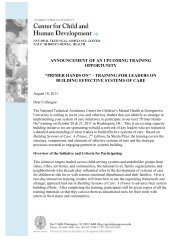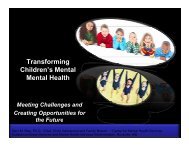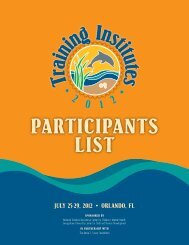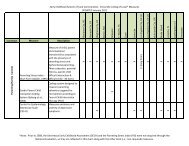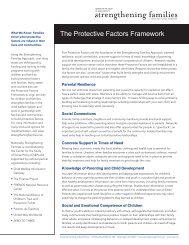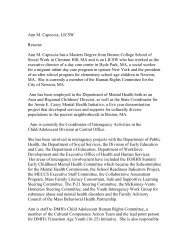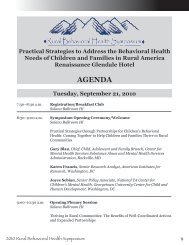Training Institutes 2012 - National Technical Assistance Center for ...
Training Institutes 2012 - National Technical Assistance Center for ...
Training Institutes 2012 - National Technical Assistance Center for ...
You also want an ePaper? Increase the reach of your titles
YUMPU automatically turns print PDFs into web optimized ePapers that Google loves.
INSTITUTES<br />
This session will include demonstrations, experiential scenarios, video snippets, and small-group exercises. Among the<br />
activities scheduled, participants will practice identifying and differentiating emotions, practicing a “hot buttons”<br />
strategy, and using effective communication skills. The faculty team <strong>for</strong> this session will offer a range of perspectives<br />
including a parent who has participated in individual and group PMTO modalities, her 11-year-old daughter who will<br />
share her perspective on some of the changes in their family, a purveyor of the model, and statewide and regional<br />
coordinators of PMTO in Michigan who are also trainers, coaches, and clinicians.<br />
MODERATOR/PRESENTER: Luann Gray, M.S.W., Michigan State PMTO Coordinator, Kalamazoo Community<br />
Mental Health & Substance Abuse Services, Kalamazoo, MI<br />
Catherine Beagle, L.M.S.W., A.C.S.W., Program Supervisor, Community Mental Health <strong>for</strong> Central Michigan, Big<br />
Rapids, MI<br />
Laura Hinkle, Parent, Community Mental Health <strong>for</strong> Central Michigan, Big Rapids, MI<br />
Laura Rains, M.S.W., M.A., Director of Implementation and <strong>Training</strong>, Implementation Sciences International, Inc.,<br />
Eugene, OR<br />
INSTITUTE #8 1:30 PM THURSDAY • 8:30 AM SATURDAY • SUN D<br />
The RENEW Model: An Evidence-In<strong>for</strong>med Intervention <strong>for</strong> Youth<br />
and Young Adults of Transition Age<br />
OBJECTIVES—Participants will learn:<br />
1. How to implement the RENEW futures planning process using graphic facilitation<br />
2. To implement specific strategies <strong>for</strong> engaging youth with personal futures planning techniques<br />
3. To link the goals and needs expressed by each youth to the development of an individualized team<br />
4. To apply basic team facilitation techniques with youth at the center of the process<br />
5. To explain how career development and youth engagement activities are linked with youth self-efficacy<br />
and self-advocacy<br />
This Institute will focus on a youth-driven, transition application of wraparound that has been implemented in New<br />
Hampshire since 1996. This model, RENEW (Rehabilitation <strong>for</strong> Empowerment, Natural supports, Education, and Work)<br />
engages, supports, and teaches youth how to find relevance in school, participate in employment, develop and pursue<br />
plans <strong>for</strong> post-high school activities, and helps each youth create critical social and community resources through<br />
individualized team facilitation.<br />
Faculty will highlight person-centered “futures “ planning using graphic facilitation, team development and facilitation<br />
with youth as leaders of the team, and strategies to develop school-to-career activities based upon each youth’s futures<br />
plan. Personal “futures planning” involves facilitation of a structured conversation with each youth and documenting the<br />
youth’s ideas, perceptions, and concerns on flip charts over the course of several meetings. Individual team facilitators<br />
use specific strategies and skills to ensure that team members contribute positively to each youth’s goal achievement.<br />
During this Institute participants will learn how to conduct the futures planning process and how to prepare and support<br />
youth and team members <strong>for</strong> individual team meetings. Participants will also learn how to develop highly individualized<br />
action plans <strong>for</strong> the transition of youth into young adulthood.<br />
Specific topics to be covered include:<br />
• Youth-driven goal setting and voice in the planning process<br />
• How youth who participate in the youth-driven process begin to construct positive self-views and take more positive<br />
steps towards their future goals<br />
• How graphic facilitation is conducted<br />
• The major features and skills required to facilitate productive youth-driven team meetings<br />
• How to engage family members, teachers, counselors, school administrators, employers and other community<br />
members to help each youth<br />
40 <strong>Training</strong> <strong>Institutes</strong> <strong>2012</strong>



